Topics:
Never Miss a Beat - Get Updates Direct to Your Inbox
FILTER:


Seven Negotiation Tips for Buying an Amazon FBA Business
By Ian Drogin
To purchase an Amazon FBA business, it’s essential that you have the right approach when negotiating with sellers. Not only can effective communication help you to secure more favorable deal terms, but it can also ensure that you’re well-positioned to succeed following the acquisition.
Contrary to what some buyers believe, most sellers don’t just consider the price when evaluating offers. In fact, many sellers will refuse to work with a buyer who doesn’t check off other boxes, even if their monetary offer is the highest.
This article will discuss seven important negotiation tips to help you close great deals for Amazon FBA business acquisitions.


Do Your Research
Before scheduling a phone call with a seller, it’s critical that you do your research in order to understand their business. Failing to do so is a sure way to undermine your professionalism and deter potential sellers from working with you.
Before entering into negotiations, the broker will present you with a comprehensive marketing package of the FBA business in question. Within the marketing package, you’ll find detailed summaries of the business’s products, financials, COGS, trends, and other important items.
It’s essential that you respect the seller’s time. Therefore, thoroughly reviewing all business information is an absolute prerequisite to any communication you have with them.
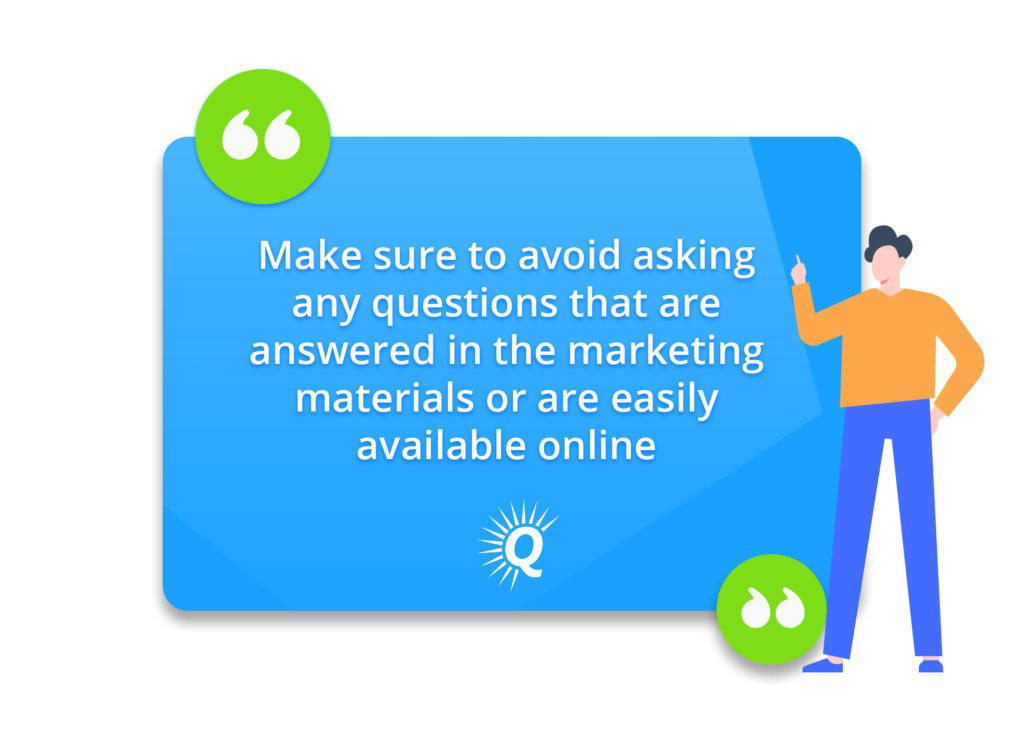

Additionally, it’s a good idea to do your own research of the business’s market, as well as any important trends that could impact the future performance of the business. Take notes and stay organized throughout this discovery process.
When it’s time to negotiate, make sure to avoid asking any questions that are answered in the marketing materials or are easily available online (e.g. a quick query on Google trends).
Doing your research doesn’t just help you to make a favorable impression; it allows you to make much better use of your time when speaking with the seller. Whether you’re a seasoned business investor or are working on your first deal, the negotiation process should be seen as an invaluable opportunity to learn about the business.
Listen To Their Story
More than likely, the seller has invested years of their life building the business you’re seeking to acquire. Therefore, as a buyer, it’s important to recognize that the business represents more than just money to the seller. It represents a part of themself.
Every entrepreneur wants to know that their story is understood and appreciated. If all you care about is the numbers, the owner will be far less motivated to sell to you and might even be resentful of your shortsightedness.
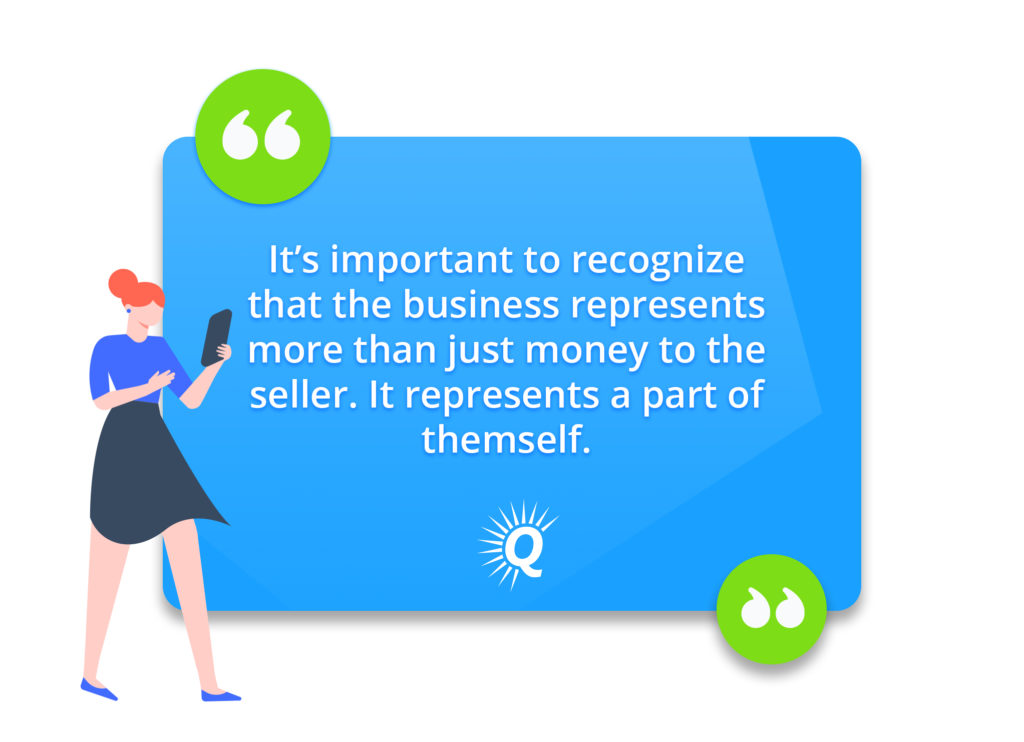

To understand why this is, it’s important to put yourself in the seller’s shoes. Anyone who has built and sold a business knows that it’s a highly emotional experience. In many cases, selling a business represents a significant pivot in the owner’s career, as well as a personal accomplishment that is not to be overlooked.
Asking questions about the seller’s story is crucial for two important reasons:
- Gaining invaluable insight into the nature of the business
- Building rapport with the seller and ensuring that they feel appreciated
Often, some of the key elements of a business’s success can only be understood by asking the right questions and listening carefully to what the seller has to say.


Asking the seller about their story also helps build a connection between you and them. As a general rule, people like to work with others who appreciate them. When a seller sees that you actually care about their journey, they’ll be far more likely to entertain an offer you put forward on their business.
To learn about the seller’s story, ask them questions that go beyond the financials and numbers within their business. Ask them things like:
- Why did they decide to start their business?
- What did they most/least enjoy about running the business?
- What are they most proud of in their business?
- Were there any challenges that were particularly difficult?
Such questions not only help to create rapport between yourself and the seller but also provide you with a much more visceral understanding of what owning the business will actually be like. Numbers and facts are important in business, but so is the human experience. The latter is too often overlooked among buyers.
Compliment their Amazon FBA Business
Everyone loves to be complimented, and Amazon business owners are no different.
After listening to their story, try to identify qualities of their business that you particularly appreciate. Perhaps, you really love their branding and product packaging. Or, maybe you appreciate the clever copy they use on their product pages or follow-up emails. Whatever it is, be sure to let the owner know that you recognize the unique strengths of their business.


You can also complement their general strategy or the quality of their products. Acknowledging their efficient inventory management practices or exceptional product reviews will be greatly appreciated by the owner.
Buy a Profitable Online Business
Outsmart the startup game and check out our listings. You can request a summary on any business without any further obligation.
Unfortunately, buyers sometimes take the opposite approach.
Among some, there is a false belief that criticizing the business will lead to the owner accepting a lower offer. The narrative goes as follows: “your business has all these problems, so therefore you should accept less money for it.”
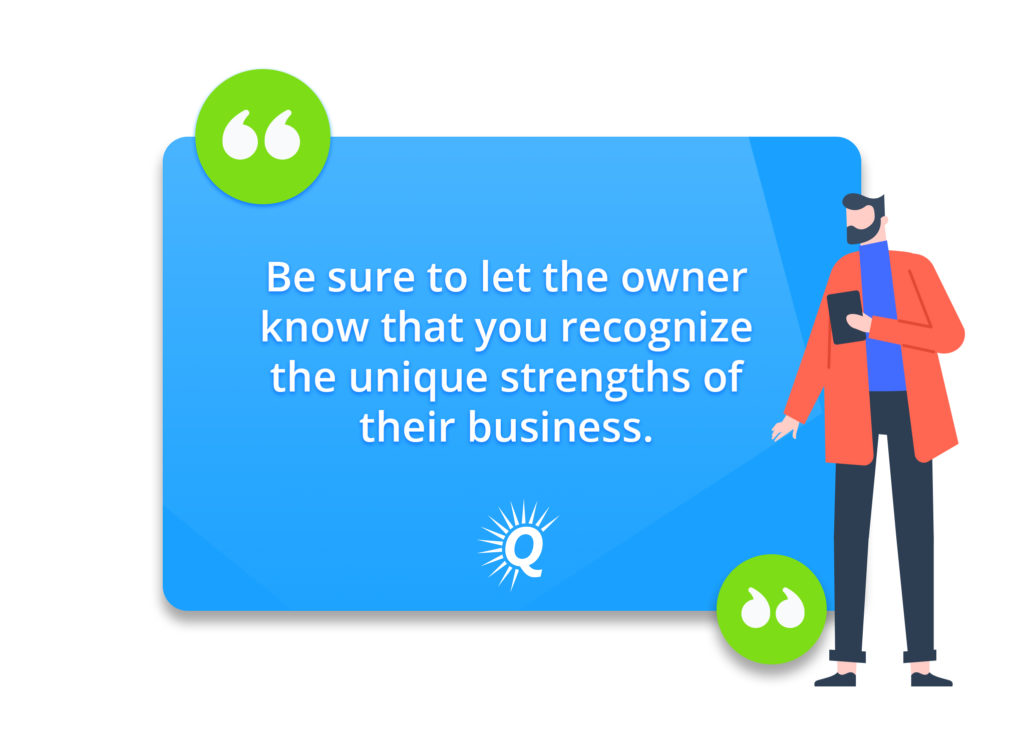

If your criticisms of the business aren’t valid, then you’ll appear to be either disingenuous or out of touch with what’s really going on in the business. More than likely, the owner will think to themself, “uh, who does this person think they are?”
If you do have some legitimate concerns about the business, they should certainly be addressed. However, you should not communicate them in the form of criticism or insult. Rather, it’s best to ask questions about the areas of the business for which you have concerns. An honest seller will be transparent and tell you the business’s weaknesses without you needing to throw them in the owner’s face.
Explain The Unique Skills You Can Bring to the Business
After you’ve gained an in-depth understanding of the business and complimented the owner’s hard work, it’s time to explain what you can bring to the table to ensure its future success.
Sellers certainly want to exit with a nice paycheck, but that’s usually not the only thing they care about. Most entrepreneurs care about what happens to their business after the sale. Even if you make a fair offer, a seller may hesitate if they doubt your abilities to continue the success that they’ve started. Therefore, make sure to discuss your relevant skills and experience.
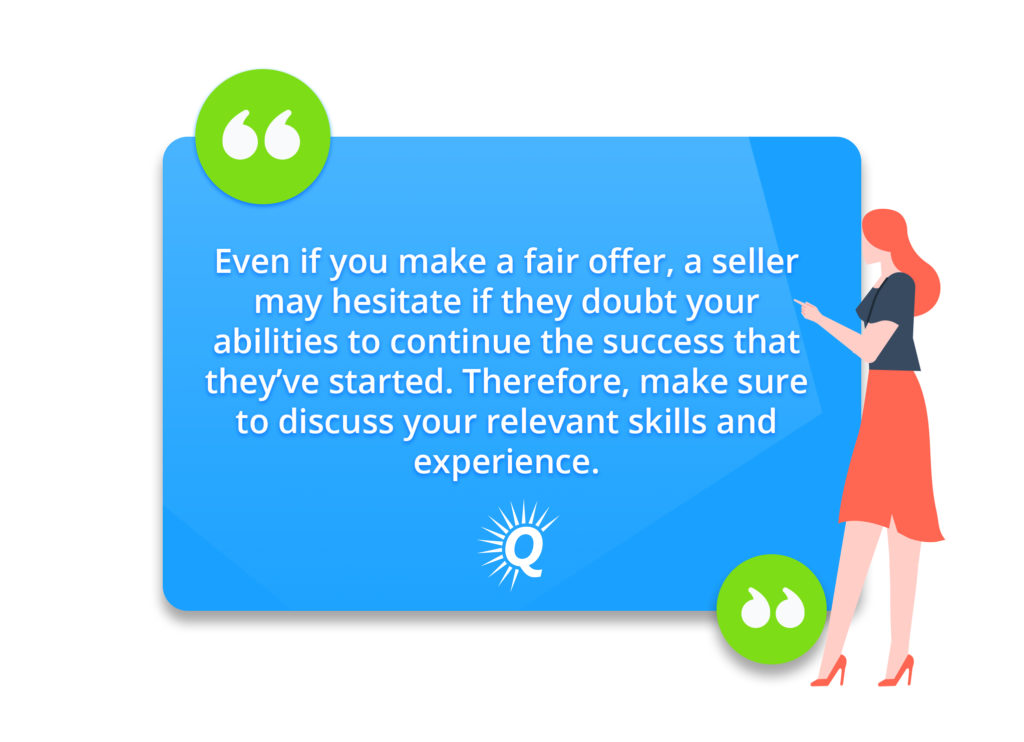

When you explain your skills, it’s important to do so in a tactful manner. In other words, don’t insult the owner by implying that you’re better than them or that they’ve been doing a poor job of running the business.
Thinking of Selling Your Business?
Get a free, individually-tailored valuation and business-readiness assessment. Sell when you're ready. Not a minute before.
For example, it probably won’t make a favorable impression if you say something like, “first of all, I would eliminate all of the wasteful advertising spending and replace the low-quality product photos.”


Instead, speak to your strengths without ragging on the business. For example, a better way to communicate your value might be, “since I have over 7 years of Facebook ad management experience, I would be really excited to build on what you’ve created by implementing proven Facebook campaign strategies in order to continue growing the business and contribute to its ongoing success.” Such a statement would probably be much more appreciated by a seller.
In addition to discussing your specific skills, it’s also wise to mention any experiences that positively reflect on your ability to lead the business forward. A few items to talk about include:
- Any successful businesses you’ve started
- Businesses you’ve purchased and then continued building
- Industry-specific work roles or accomplishments
- Investment success


If you’ve had success in any of these areas, it’s not a bad idea to let the seller know. Of course, don’t be cocky or self-righteous when communicating your expertise, but do make sure that the seller understands your unique skills and qualities that will help you to be a great new owner of their prized business.
Talking about the skills and strategies you would bring to the business is also a great way to demonstrate your understanding of the unique opportunities it faces. If you have listened carefully to everything the seller has shared and can provide a personalized assessment of where you can take the business next, it will show the seller that you’ve been paying attention and know what you’re doing.


While it’s a wise idea to communicate your qualifications, it’s important to note that you shouldn’t oversell yourself. Don’t take up the entire conversation talking about yourself. Make sure that your discussion focuses on the business, and mention your skills and experience only when it is appropriate and relevant.
Understand the Buyer Landscape
Most business listings receive interest from many different buyers. Just as you’re shopping the marketplace for the right business to buy, the seller you’re working with is paying close attention to all the different buyer options available to them.
When buying an FBA business, it’s important to examine not just different businesses and sellers, but also what kinds of buyers are active in the marketplace. Without paying attention to what buyers are offering, you won’t have a reference point to inform your own offer.
Different kinds of businesses typically receive different offers and deal structures. Even within the category of Amazon businesses, different businesses are considered for different kinds of deals.
A few characteristics that determine the kinds of offers a business generally receives include:
- Size
- Trends
- Margins
The owner of a large business that is experiencing rapid growth will expect a much different offer and deal structure than a small business that has plateaued or is declining. Therefore, you should always examine the market in order to look at similar businesses and see what offers and deal structures are typical.
Once you have a good idea of what different buyers are offering, it’s smart to think about what you can offer that is unique. Two deal structures that most sellers love include:
- SBA financing
- All cash offers
An SBA loan is a great way to leverage your purchasing power and enable yourself to offer a deal that sellers will love.
With an SBA loan, you can invest a relatively small down payment while the seller receives the vast majority of the purchase price at closing. This creates a win-win scenario for both parties.


While using an SBA loan is a desirable option in many cases, there are certain criteria, and the SBA evaluates each deal on a case-by-case basis. In general, the SBA will examine the business’s ability to repay the loan, the creditworthiness of the buyer, and the way in which the deal is structured. This post goes into more detail about the SBA lending process.
The most desirable offer for sellers is an all-cash offer. If you have capital at your disposal, offering all cash upfront is a sure way to impress sellers and capture their attention.
Unlike SBA loans, you and the seller have complete flexibility when determining the deal terms of an all-cash offer. Also, more than likely, the seller is going to be willing to negotiate other aspects of the deal more if they know that they’ll be receiving the full purchase price at closing.
Don’t Low Ball
If you examine a business, speak with the seller, and everything looks as promising as it appears on the surface, the last thing you want to do is make a low-ball offer.
Right now, there is a strong market for Amazon businesses and sellers have options. There are a couple of clear reasons why making a low-ball offer isn’t a good idea:
- Low-ball offers a waste of time for both you and the seller.
- A low-ball offer may deter a seller from negotiating a more reasonable offer with you later.
First and foremost, low-ball offers are a waste of everyone’s time. Since Amazon businesses are hot commodities, the chances of a seller accepting an undervalued offer are slim to null. Why would you go through all of the work of examining a business and interviewing a seller only to finish the process with an offer that is sure to get rejected?
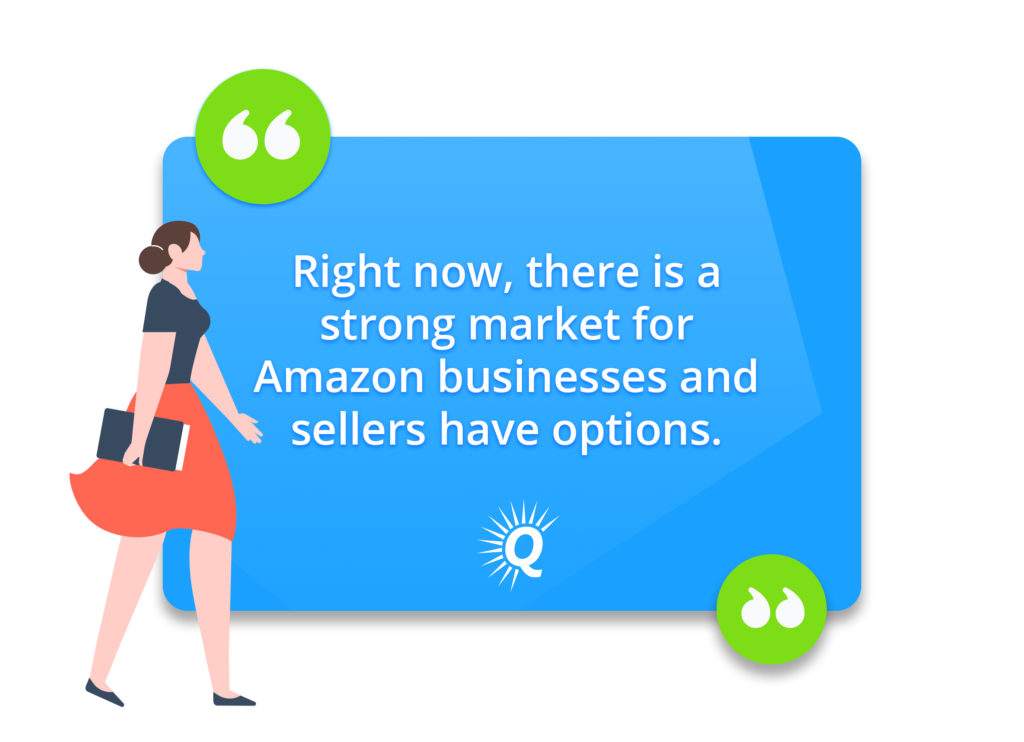

Of course, bad offers are a waste of the seller’s time as well. More than likely, the owner you’re working with has a busy schedule and is in communication with many different buyers. If you throw out an unreasonably low offer, the seller will likely resent you for wasting their time.
Don’t exploit the deal flow process
It’s typical for buyers to do thorough research and ask many questions when examining a potential FBA business acquisition. After all, understanding the specific business is an essential step in your decision-making process.
The nature of business deals involves the seller investing significant time to showcase the asset they’ve built before receiving money from a buyer. While the seller is expected to cooperate and answer your questions, it’s important to not disrespect them by taking their time for granted.
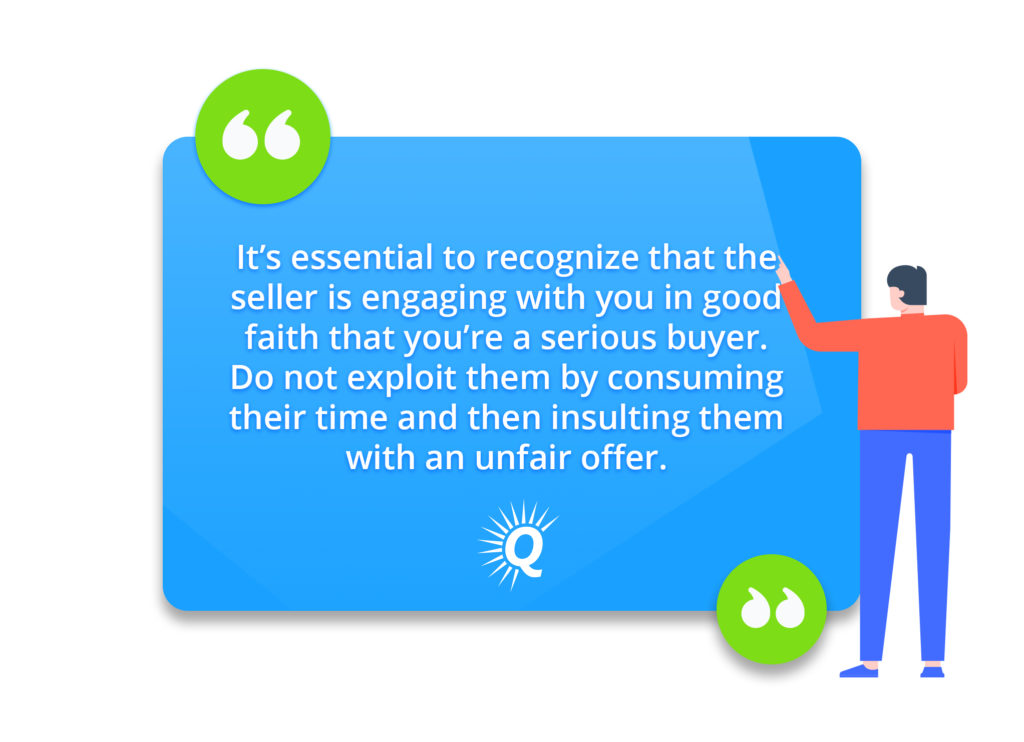

If a seller gives you their time in the form of answering questions or getting on the phone with you, it’s essential to recognize that the seller is engaging with you in good faith that you’re a serious buyer. Do not exploit them by consuming their time and then insulting them with an unfair offer.
A low-ball offer won’t just be rejected; it may also be perceived as taking advantage of the fact that they’ve already given you their time and attention, and for good reason. If you know their listing price and their business matches the expectations they’ve set in the marketing package, you already have a clear idea of what they want to receive. If you request information and phone meetings, you should be willing to make a fair offer if everything checks out.
In addition to the ethical reasons for not low-balling, there are some very practical considerations as well.


Making an unfair offer after the seller has already invested their time speaking with you will likely leave a bad taste. Since sellers care about more than just the money they receive, a low-ball offer can undermine any future offers you put forward.
Even if you follow up with a fair or even generous offer, the seller may think to themself, “Well, this person already tried to waste my time and take advantage of me, so now I’m not sure I even want to consider selling to them.” This may be especially true if the seller has received other fair offers from qualified buyers (which is probably the case).
In short, making a low-ball offer won’t just get a rejection, it will also likely create resentment and prevent further negotiations from taking place.
Have Your Finances In Order
You’ve found the right business to buy, negotiated with the seller, and signed the Asset Purchase Agreement. Now, it’s time to ensure that the transaction goes smoothly. One of the last things you want to do is slow down the process by not having funds available when it’s time to close.
In today’s marketplace, there is an abundance of private equity firms that are able to close deals in 35 days or less. Therefore, as an individual buyer, it’s important that you’re well prepared to move the process along quickly. Otherwise, you’ll risk losing promising deals to eagerly awaiting aggregators.
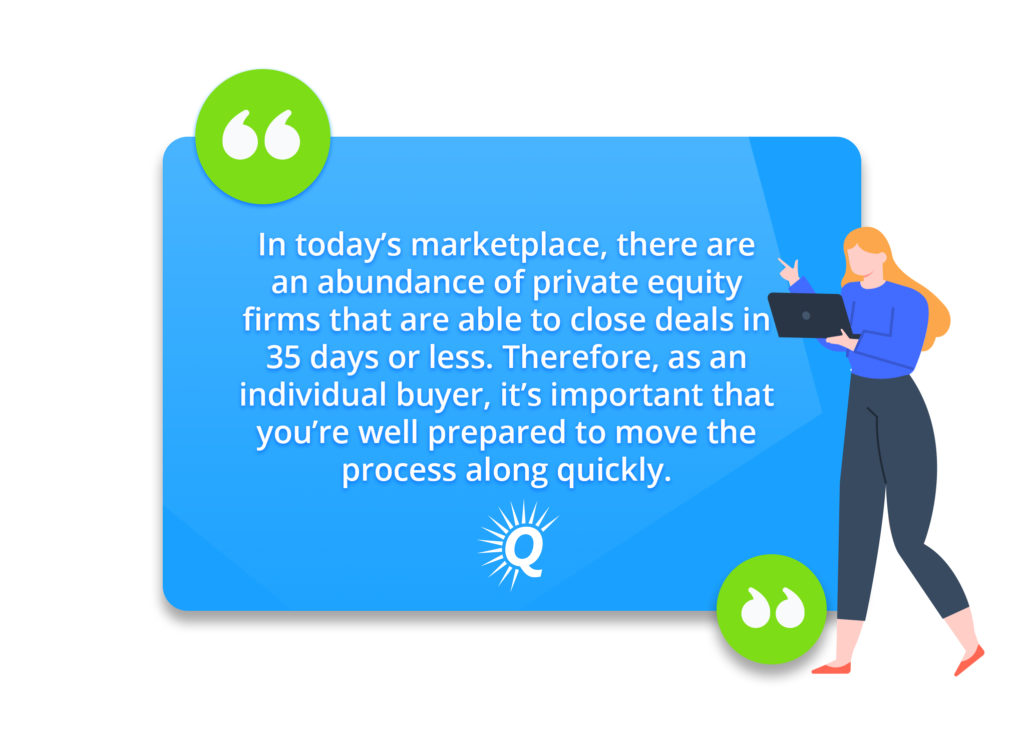

If you’re like a lot of buyers, purchasing an Amazon FBA business represents a significant financial investment. As such, it’s likely that you’ll need to do a bit of planning to ensure that you have liquid capital ready to deploy when the right opportunity arises.
For some, this may mean selling certain investments. For others, it means transferring money between accounts. Whatever you need to do, it’s a good idea to plan ahead and take the necessary steps before you approach the final steps to complete the transaction.
Conclusion
There are numerous benefits to investing in Amazon businesses, and navigating the marketplace effectively is crucial when it comes to finding the right investment opportunity and negotiating with the seller. As in all relationships, being thoughtful, respectful, and ethical is critical in all business deals.
By understanding yourself, the marketplace, and following this framework, you’ll be in a great position to acquire an excellent Amazon business that you can continue growing. Not to mention, you’ll be able to establish a positive relationship with the seller and enjoy a more pleasant and cooperative experience through the transfer of ownership process.





